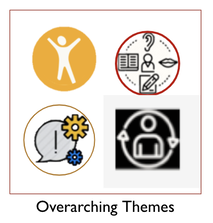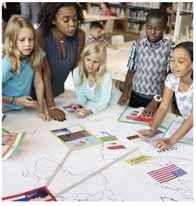 By: Theresa Andersen How can I fulfill my professional development requirements during COVID? I am so emotionally drained, and you want me to attend a professional development conference? As a former teacher and school principal, I could relate to these questions and react to being asked to attend a professional development conference in these unprecedented times. I believe that many teachers have expressed this, if not saying it to their administrators, but saying it to themselves. The week of November 9th, the NYS Coalition for Independent and Religious Schools held their 36th Annual RISE Conference, a virtual event that made it possible for teachers to attend professional development events from the comfort of their homes. Also, for those who could not attend the conference that week, the New York State Office of Religious and Independent Schools ("NYSORIS") is making the recorded presentations available so they can view them when they have a moment to themselves. I was fortunate to be able to attend the conference and what a remarkable week it was with over 1900 educators registered from all over New York State. The sessions were informative, thought provoking, engaging and met the needs of teachers giving them insight in helpful topics that awarded them with valuable materials to use in their classrooms, both face to face and virtual. I am now a member of the Fordham PDRC, one of the conference organizers. We worked with and supported eight presenters and I must say, it was most rewarding to attend the sessions. I worked with other members of the PDRC team to ensure that the presentations were animated, and engaging and met the high standards of Fordham University. The professional development that the PDRC offers in response to the needs and interests of the schools we serve, can be grouped in four overarching themes – social emotional, communication, problem-solving and leadership. The sessions sponsored by the Fordham PDRC, represented these vital educational areas.  Dr. Sabrina King and Dr. Kip Thompson both addressed the “social and emotional learning strategies to educate the whole child.” Dr. King’s presentation was titled, “Creating a Social Justice Lens in Learning.” Social justice means that we must treat all people with fairness, respect, dignity and provide them with the necessary resources to reach their full potential. The classroom becomes the environment for social justice in learning. Each child must be treated equally in affording each what is necessary to be successful. Dr. Thompson reminded us in his presentation, “The Positive Impact of Social Emotional Learning on Youth Development of Adolescents” that children are assets to be developed and never thought of as a liability. Children must learn how to manage their emotions and establish positive relationships with others by solving problems effectively and together. We must remember that children are influenced by their outside world and we must develop a mindset of equity that help children and us as educators alike know that being in the right state of mind is equally important for both of us.  Dr. Elizabeth Locatelli and Dr. Lori Langer de Ramirez both addressed the “tools to develop communication competences and social responsibilities.” Dr. Locatelli shared with teachers many hand-outs to help them achieve success in “Empowering Students to Make Sense of Complex Texts.” Learning the meaning of words as used in the context of a text makes it real for a student. Children will find that they can know the meaning of new words by studying the text. This helps the students use these new words in their writing and communicating. Dr. Langer de Ramirez addressed communication skills being enhanced in “Play and Language Development.” Play should be a necessary part of learning. A child’s language skills are strengthened through play. Communicating through play brings children socially connected to one another.  Dr. Joseph Ferrantelli and Mr. Christopher Vicari addressed “pedagogy for constructive knowledge, problem solving and innovation.” Dr. Ferrantelli gave teachers concrete, virtual tools, and online platforms to teach math in “Engaging Students in Mathematics in a Virtual Environment.” Teaching math is difficult to begin with, as I can attest having taught math for many years, but virtually almost seems impossible. Both the attendees and myself left excited to try what was presented and many of us want to build our own “lightboard.” Mr. Vicari enthusiastically and passionately caught everyone’s attention in “The Art of Game Design and Narrative for Learning.” Games can be added to teach lessons and how excited the children will be to know they are playing a game but are learning a lesson. Imagine children learning to solve math problems by role playing in a game they have created. Teachers were most excited at this possibility and left excited to try what they learned.  Dr. Adele Ellis and Mrs. Vincenza Ferrantelli addressed “seminars for school leaders to foster leading with presence and ethic of care”. Dr. Ellis met with school leaders and shared how to create a professional learning community in “Best Practices for Leading a School in a New Paradigm.” She had open discussions as to the trials and pressures of being a leader of a school in these times. Attendees shared their similar experiences and learned from one another how to ensure for the safety of their children and for the wellbeing of their teachers and staff. They all agreed that not knowing from one day to the next what would be happening from going face to face to virtual was a responsibility that they took seriously and with compassion. I especially related to this presentation having just retired from 25 years as principal. Mrs. Ferrantelli addressed a topic that most educators and school leaders were most concerned with “Best Practices for Working Remotely with Students receiving Special Education.” Having worked in special education her whole career, she was able to share many useful practices to help educators and leaders understand the extreme difficulty reaching these special children and helping them the best they could. The attendees left with many useful practices that can help with teachers’ overall frustration in making a difference in the lives of these children who need face to face so much. As a teacher and then an administrator, how to juggle helping children with special needs in the general education classroom was always a challenge. Mrs. Ferrantelli gave many useful suggestions. I found this virtual conference a wonderful experience. I feel participants were able to learn much from all the presentations, including those sponsored by the Fordham PDRC. To lessen the anxiety of attending professional development by doing it virtually was a highlight that I feel teachers and administrators greatly appreciated. You may want to watch this video to learn more about who we are and our perspective to providing timely and personalized professional development opportunities to teachers, school and district leaders. Click here! I invite you to contact us if you have any questions or any professional development needs that we may be able to help you with.
0 Comments
Your comment will be posted after it is approved.
Leave a Reply. |
Archives
January 2024
Categories
All
|
